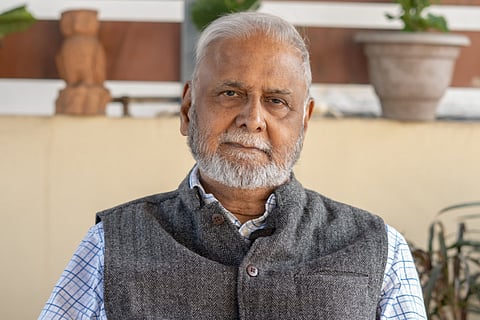

Follow TNM’s WhatsApp channel for news updates and story links.
Jagdeep S Chhokar, a staunch champion of electoral and political reforms, passed away in Delhi on Friday, September 12, after suffering a heart attack. He was 81.
A founding member of the Association for Democratic Reforms (ADR), Jagdeep was a strong advocate of transparency in Indian politics, especially through his campaigns for free and fair elections. It was a legal battle spearheaded by ADR, with him as one of the lead petitioners, that resulted in the Supreme Court declaring electoral bonds unconstitutional.
Jagdeep began his career as a mechanical engineer with the Indian Railways. He later became a professor, Dean, and Director In-Charge at the Indian Institute of Management, Ahmedabad. After retirement, he devoted himself fully to activism for democracy, a commitment he upheld for 25 years until his last breath.
According to sources close to his family, Jagdeep suffered a heart attack at 3.30 am. He had been undergoing treatment for a fractured shoulder sustained in a fall and had also developed a lung infection during his recovery.
Jagdeep forayed into activism through his IIM colleague Trilochan Sastry, whose scrutiny of the nomination papers of candidates contesting the 1999 Lok Sabha elections from Ahmedabad raised crucial questions regarding transparency.
At the time, candidates were only required to provide basic details such as name, address, voter registration number, and father’s or husband’s name. Academics, including Jagdeep and Sastry, demanded that voters be given more information to make informed choices. This campaign led to the formation of ADR. Acting on their petition, the Delhi High Court in November 2000 ordered candidates contesting the Lok Sabha and Assembly elections to submit sworn affidavits disclosing their details, including educational qualifications, income, and criminal records.
When the Union government appealed, the Supreme Court gave the Election Commission two months to implement the High Court’s order. The move was met with unanimous opposition from politicians, who called for amending the Representation of the People Act, 1951. The government even decided to promulgate an ordinance after the Lok Sabha was adjourned sine die. ADR ultimately moved the Supreme Court, which in March 2003 struck down the amendment as unconstitutional.
Jagdeep remained tireless even in his 80s, continuing his campaigns against electoral bonds and for the purification of electoral rolls. He also raised concerns about the special intensive revision in Bihar, warning that it could result in the disenfranchisement of citizens. The ADR was also behind major electoral reforms, including disclosure of property and criminal antecedents of candidates.